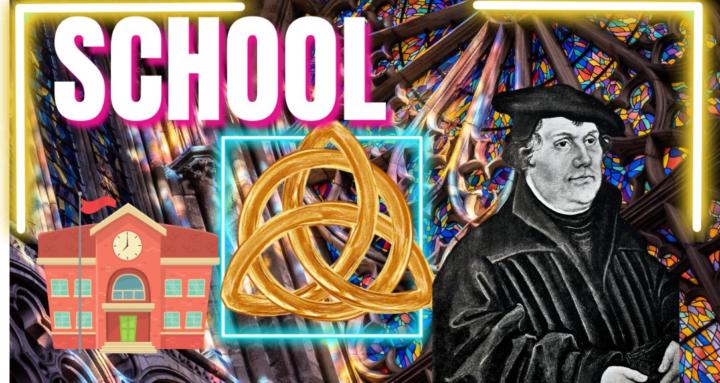Sunday Sermon Sept 13 2025 - Jonah 1 The Running Man
Sermon Summary: "The Running Man" (Jonah 1) This sermon, preached at Covenant Church of Perrysburg on September 14, 2025, explores the opening chapter of the Book of Jonah, focusing on the theme of human rebellion against God's call and His sovereign pursuit in response. Titled "The Running Man," it portrays Jonah as a reluctant prophet who flees from divine mission, highlighting God's relentless grace amid disobedience. The message draws directly from Jonah 1 (ESV), emphasizing that no one can outrun God's purposes. Below is a structured summary with main points, subpoints, and key Bible verses quoted verbatim from the English Standard Version (ESV). Main Point 1: God's Sovereign Call God initiates His plan by commissioning Jonah, revealing His concern for even the most unlikely recipients of mercy (Nineveh, Israel's enemy). - Subpoint 1.1: The Word Comes to Jonah God speaks directly to His prophet, underscoring that divine missions often involve uncomfortable obedience. Key Verse (Jonah 1:1-2 ESV): "Now the word of the Lord came to Jonah the son of Amittai, saying, 'Arise, go to Nineveh, that great city, and call out against it, for their evil has come up before me.'" - Subpoint 1.2: The Urgency of the Task Nineveh's wickedness demands immediate action, showing God's heart for repentance over judgment. Main Point 2: Jonah's Foolish Flight Despite knowing God's character, Jonah chooses self-preservation over submission, illustrating the futility of running from the Creator. - Subpoint 2.1: Deliberate Rebellion Jonah heads in the opposite direction, from Israel's heartland toward the distant Tarshish, symbolizing a rejection of God's global compassion. Key Verse (Jonah 1:3 ESV): "But Jonah rose to flee to Tarshish from the presence of the Lord. He went down to Joppa and found a ship going to Tarshish. So he paid the fare and went down into it, to go with them to Tarshish, away from the presence of the Lord." - Subpoint 2.2: The Illusion of Escape Jonah's actions reveal a deeper prejudice against God's mercy for outsiders, a common human tendency to limit divine love.

August 17th Sermon - Bittersweet
Summary of the Sermon "Bittersweet" This sermon, based on the events leading to Jesus' crucifixion in Matthew 27:15-44, explores the profound suffering and shame Jesus endured, humanity's role in it, and the redemptive power of the cross. It emphasizes God's sovereignty in fulfilling scripture through these events and calls believers to respond with awe and transformed lives. Main Points: - Pilate's Foolishness and People-Pleasing: Pilate, aware of Jesus' innocence, succumbs to the crowd's pressure by releasing Barabbas (a murderer and insurrectionist) instead of Jesus. He washes his hands to proclaim innocence, but this act highlights his failure to do what is right, drawing parallels to modern people-pleasing behaviors. - Humanity's Wickedness: The sermon illustrates the depth of human sin through the mocking, scourging, and crucifixion of Jesus, showing how the crowd, soldiers, and religious leaders embody unrighteousness, hatred, and cruelty—reflecting broader sinful tendencies like those listed in Galatians 5:19-21. - Fulfillment of Scripture and God's Sovereignty: Jesus' suffering, including being offered wine mixed with gall and the dividing of his garments, fulfills prophecies from Psalms 69 and 22. Despite the chaos, God orchestrates these events according to His plan, as affirmed in verses like Job 42:2 and Proverbs 19:21. - The Substitutionary Death of Jesus: Jesus takes the place of sinners (symbolized by Barabbas' release), becoming sin for humanity to enable righteousness and salvation. This is described as necessary for redemption, with the cross as both a stumbling block to some and God's power to believers. - The Bittersweet Nature of the Cross: The events evoke anger at Jesus' mistreatment but also gratitude for the salvation it brings. Believers are urged to live lives worthy of this calling, avoiding apathy and sharing the gospel. Key Bible Verses Referenced: - Matthew 27:15-44: Core passage detailing Jesus' trial, the choice of Barabbas, Pilate's hand-washing, mocking, scourging, and crucifixion. - John 19:4, 7, 10, 11, 16: Pilate declares Jesus' innocence but yields to fear and pressure, handing him over for crucifixion; Jesus warns of greater sin. - Luke 23:18: The crowd demands Barabbas' release over Jesus. - Galatians 1:10: Contrasts seeking human approval with serving God, critiquing Pilate's actions. - James 4:17: Knowing the right thing but not doing it is sin, applied to inaction like Pilate's. - Ephesians 2:10: Believers are created for good works, urging a response to the cross beyond apathy. - Romans 3:10: None are righteous, underscoring humanity's sin in Jesus' treatment. - Galatians 5:19-21: Lists sinful works of the flesh evident in the crucifixion events. - Psalm 69:21: Prophecy of offering sour wine, fulfilled at the cross. - Psalm 22:7, 18: Foretells mocking and dividing garments, fulfilled in Jesus' suffering. - Job 42:2: God's purposes cannot be thwarted. - Proverbs 19:21: The Lord's counsel stands despite human plans. - 1 Corinthians 1:22-25: The cross as foolishness to the world but God's wisdom and power. - 2 Corinthians 5:21: Jesus became sin for us so we might become righteous. - Hebrews 12:2: Jesus endured the cross for the joy set before him. - Ephesians 4:1: Live a life worthy of your calling in response to the cross.
Summary of the Sermon: "What A Day That Will Be!" (Matthew 26:17-19, 26-29)
Summary of the Sermon: "What A Day That Will Be!" (Matthew 26:17-19, 26-29) The sermon, delivered at Covenant Church of Perrysburg on August 10, 2025, explores the significance of the Lord's Supper (Communion), tracing its roots in the Passover, its institution by Jesus, and its forward-looking hope. The core Bible passage is Matthew 26:17-19, 26-29 (ESV):"Now on the first day of Unleavened Bread the disciples came to Jesus, saying, 'Where will you have us prepare for you to eat the Passover?' He said, 'Go into the city to a certain man and say to him, "The Teacher says, My time is at hand. I will keep the Passover at your house with my disciples."' And the disciples did as Jesus had directed them, and they prepared the Passover. [...] Now as they were eating, Jesus took bread, and after blessing it broke it and gave it to the disciples, and said, 'Take, eat; this is my body.' And he took a cup, and when he had given thanks he gave it to them, saying, 'Drink of it, all of you, for this is my blood of the covenant, which is poured out for many for the forgiveness of sins. I tell you I will not drink again of this fruit of the vine until that day when I drink it new with you in my Father's kingdom.'" The sermon is structured around three main points, with sub-points and relevant full Bible verses included below. Main Point 1: Background for the Lord's Supper This point connects the Lord's Supper to the historical Passover in Exodus, emphasizing themes of divine judgment and deliverance. - Sub-point 1.1: Divine Judgment in the PassoverThe Passover was instituted amid God's judgment on Egypt for oppressing Israel and practicing pagan religion. God's patience with sin has limits, and judgment is inevitable—either through eternal condemnation or Christ's substitutionary death. Exodus 1:14 (ESV): "and made their lives bitter with hard service, in mortar and brick, and in all kinds of work in the field. In all their work they ruthlessly made them work as slaves." Exodus 7:13 (ESV): "Still Pharaoh's heart was hardened, and he would not listen to them, as the Lord had said." Exodus 12:12 (ESV): "For I will pass through the land of Egypt that night, and I will strike all the firstborn in the land of Egypt, both man and beast; and on all the gods of Egypt I will execute judgments: I am the Lord." Exodus 14:27 (ESV): "So Moses stretched out his hand over the sea, and the sea returned to its normal course when the morning appeared. And as the Egyptians fled into it, the Lord threw the Egyptians into the midst of the sea." - Sub-point 1.2: Divine Deliverance in the PassoverGod graciously provided redemption through the sacrificial lamb's blood, allowing the destroyer to pass over Israelite homes. This prefigures Christ's deliverance, celebrated as a certainty even before full redemption. Exodus 12:23 (ESV): "For the Lord will pass through to strike the Egyptians, but when he sees the blood on the lintel and on the two doorposts, the Lord will pass over the door and will not allow the destroyer to enter your houses to strike you." Exodus 14:30 (ESV): "Thus the Lord saved Israel that day from the hand of the Egyptians, and Israel saw the Egyptians dead on the seashore." Exodus 12:17 (ESV): "And you shall observe the Feast of Unleavened Bread, for on this very day I brought your hosts out of the land of Egypt. Therefore you shall observe this day, throughout your generations, as a statute forever."
Self Preserving - Sunday Sermon Summary - August 3rd 2025
Sermon Summary: Matthew 26:1-3, 36-46 and Beyond Main Point 1: The Battle of the Flesh Jesus faces intense emotional and spiritual anguish in Gethsemane as He prepares for the cross, demonstrating the reality of His human struggle while remaining committed to God's will. - Subpoint 1: Recognizing God's Wrath - Subpoint 2: Resolving to Do God's Will Main Point 2: Betrayal by a Friend Jesus willingly endures betrayal by Judas, demonstrating restraint and commitment to God’s redemptive plan despite the opportunity to avoid suffering. - Subpoint 1: Restraint in the Face of Betrayal - Subpoint 2: Reason for His Submission Main Point 3: Blasphemy by Fools Jesus endures mockery, false accusations, and humiliation, yet responds with humility, demonstrating His selfless love and commitment to God’s glory and humanity’s salvation. - Subpoint 1: Humiliation of Christ - Subpoint 2: Humility of Christ Conclusion The sermon contrasts humanity’s self-preserving nature with Jesus’ soul-procuring mission. Through His anguish in Gethsemane, betrayal by Judas, and humiliation by mockers, Jesus demonstrates unparalleled love, obedience, and humility to fulfill God’s plan for salvation. Believers are challenged to die to self, trust God’s will, and follow Christ’s example of suffering well for the sake of others.
1-5 of 5
Suggested communities
Powered by


